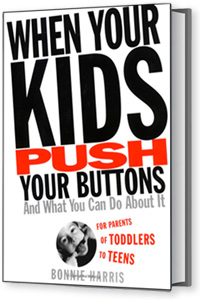When we engage in power struggles with our children, it means we are invested in being right. When we must be right—”I’m the parent, I know best. You must do what I say”—the child is wrong and is left feeling powerless. The child then must fight back to preserve integrity; either that or the easy-going child submits again and again learning in the process to seek the approval of others to gauge her self-worth.

Engaging in a power struggle keeps the parent in the position of having to be right.
Backing down from the fight may feel too vulnerable for many parents. The parent expect the child to back down, to give up, to acknowledge being wrong — in other words, the parent expects the child to be the grown-up first.
Parents often feel at a loss when they don’t know what to do, when what’s “right” is not apparent. It feels weak and scary. But this place of doubt, the space where you just don’t know, where vulnerability lives, is a place of opportunity — one never found when holding on to being right.
This is your teachable moment, because you are present. Stepping out of the power struggle means your agenda is not dictating right or wrong. The problem comes when you allow this space of unknowing to fill you with frustration and fear — when you think you have to have the answer in order to maintain a power and control position with your child. Bertrand Russell once said that the trouble with the world is that stupid people are cock-sure and smart people are full of doubt!

Imagine feeling confident in not knowing. Imagine not engaging in the power struggle. Imagine saying to a child who is demanding what he wants and telling you what to do, “I don’t have an answer for that” — not in a defeated way but in a calm and assured way. It can bring everything to a halt. The fight does not happen if you do not engage. Your child can relax; you can relax. Then you can work it out together. You’re declaring that you want peace, not conflict.
Then acknowledge, “You really want what you want, and I’m just not sure. Looks like we need to talk about it and make sure we come to an agreement that works for both of us. Tell me again what you want and why you want it.”
Problem solving is the approach that allows both you and your child to be heard.

In this new space, your child will feel listened to and heard. He won’t have to fight for what he wants, because you are not putting up resistance. With problem solving, you do not have to agree. Simply hear your child and be considerate of his agenda, no matter how trite or wrong it may seem. And remember the very young child does not respond to your logic, as he doesn’t have the brain development to understand. But once he feels heard, he will likely be calmer and more rational.
You can listen and then state your case. “Hmmm. I hear what you’re saying. Here’s my concern/desire… How can we make this work for both of us?” Then agreements are reachable. Or the situation naturally dissipates when there is nothing for the child to fight against.
Some tips on Being Right vs Being Present:
- Take several deep breaths instead of reacting with an “I’m right” attitude.
- At a different time, teach your child how breathing can help with getting to calm.
- Think: This is an opportunity, a teachable moment if I stay calm.
- Take your child seriously even if she is angry and defiant.
- Acknowledge what you see as her determination instead of defiance.
- Tell her you don’t know what your answer is or simply acknowledge what she wants.
- Take the time you need to think it through.
- Help her calm and then ask her to tell you again what she wants.
- State calmly what you want or don’t want.
- Ask, “How can we make this work for both of us?”
What techniques do you use to handle power struggles with your child? Let me know in the comments below.

We punish our children in an attempt to keep them from pushing our buttons, often escalating the original problem into a cycle of anger and blame. When Your Kids Push Your Buttons is not about what to do to your kids to get them to stop pushing your buttons. This book is about how to be the parent you wish you could be-the parent that only you are holding yourself back from.







